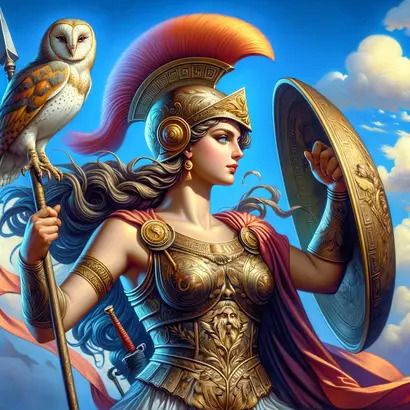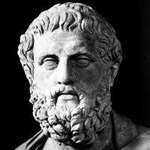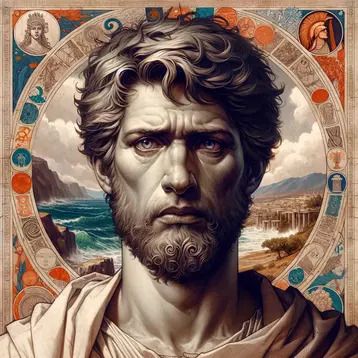
Teiresias
Teiresias was, perhaps, the most famous of all ancient Greek seers. Son of Everes and Chariclo, he lived through seven generations, from the days of Cadmus and all the way to the time of Oedipus and his children. He was blinded either by Athena or by Hera for having either seen the first one naked or offended the latter goddess by taking Zeus’ side in a marital argument. However, his punishment came with subsequent rewards: the gifts of foresight and long life. Additionally, Teiresias was the only one who retained his prophetic powers even in the Underworld, where he was visited by Odysseus and to whom he gave numerous great pieces of advice.
Teiresias’ Family
Through his father, Everes, Teiresias was a descendant of Udaeus, one of the five sown men of Thebes (the Spartoi); Teiresias’ mother, on the other hand, was a nymph named Chariclo, a devoted servant of Athena. In fact, she was her favorite: at least according to one surviving account – Callimachus’ fifth hymn – Athena loved Chariclo “to distraction, loved her more than any other… and they were always together.”
The Origin of Teiresias’ Blindness and His Prophetic Gifts
Teiresias, the Accidental Voyeur · Athena
There was nothing to suggest Teiresias’ extraordinariness during all of his childhood and the early parts of his adult life. That all changed when one sweltering summer day, the “just bearded” Teiresias climbed down Mount Helicon with his hunting dogs to quench his thirst with the waters of Hippocrene. Unfortunately for him, just a few moments before he made that fated decision, Athena and Chariclo had unbuckled their robes and plunged for a refreshing cooldown in that very same spring. Since Teiresias saw what no mortal was allowed to ever see – a naked goddess – Athena immediately took the boy’s eyes. This, naturally, both angered and saddened Chariclo, who started screaming at her best friend, pleading for mercy and her son’s eyesight. However, as dear as Chariclo was to her, Athena couldn’t do anything since it was not up to her, but to the divine laws of Chronos.
“You mustn't grieve so, darling,” eventually she uttered. “Your son will be honored, all for your sake, by divine gift to him. I'll make him a prophet, his fame will be mythic, the greatest prophet that ever has been. He'll know all the birds in the sky, those of good omen and those whose flight presages doom. He'll give oracles to the Boeotians, oracles to Cadmus, oracles to the mighty descendants of Labdacus. I will give him a great staff to guide his footsteps, and I will give him time, a long term of life, and he alone, when he dies, will walk among the dead, wits intact, honored by Hades, host of the dead.”
Teiresias and His Sex Change · Zeus and Hera
Another story links Teiresias’ prophetical powers to the extraordinary story of his sex change. In this case, Teiresias was roaming through either through the rocky crags of Mount Cithaeron (in Thebes) or through the mountain valleys of Cyllene (in Arcadia). Either way, at one point, he happened upon two snakes copulating. Disgusted by the scene, he struck them and wounded at least one of them. Hera didn’t like this one bit, so she turned Teiresias into a woman. He spent the next seven years of his life living as a priestess of Hera. It was during this period that he gave birth to his most famous child, Manto, a famous prophetess herself. At the end of the seventh year, he came across the same two snakes mating yet again. Having learned his lesson, this time Teiresias made sure not to touch them and, as a result, he was freed from his sentence and regained his masculinity.
Years later, a bitter argument erupted between Zeus and Hera over the matter of sexual pleasure; apparently, the sovereign couple couldn’t agree over who – men or women – find more enjoyment in the act of making love. Since Teiresias was in a unique position to arbitrate, they turned to him for the answer. “Of ten parts a man enjoys one only,” replied Teiresias, “but a woman enjoys the full ten parts in her heart.” Not at all pleased with the answer, Hera blinded Teiresias at the spot; happy with it, Zeus recompensed Teiresias by awarding him the gifts of prophecy and very long life.
Teiresias’ Prophecies
Teiresias lived through seven different generations, and many great Thebans were blessed with the privilege of consulting him; unfortunately, not all of them believed or took him seriously.
Teiresias’ Early Prophecies · Narcissus and Amphytrion
By all accounts, it seems that Teiresias first became famous as a seer when he told Narcissus that he was bound to live a long life – lest he “comes to know himself.” As the story goes, Narcissus once saw the reflection of his face in a spring and fell in love with himself – an event which led to his eventual demise. Tiresias’ prophecy was fulfilled. On a side note, this is how all of Teiresias’ prophecies looked like: brief, enigmatic, exact; and usually featuring a potentially redemptive stipulation.
Once Teiresias’ assured his reputation in the case of Narcissus, people from all over Greece started visiting him to find a solution for their problems. One of these was the utterly confused Amphitryon, whose wife Alcmene didn’t seem at all welcoming to him on his return from the war against the Taphians; moreover, she insisted that he had, in fact, returned a day before and that they had already slept together the previous night. Amphitryon went to Teiresias to find out if Alcmene was lying to him, and the seer quickly cleared everything up: it was Zeus, disguised as him, that lay with Alcmene one night before Amphitryon came back. Now, we don’t know whether Amphitryon felt better after finding out the truth, but we do know that there was nothing he could do about it.
Teiresias’ Late Prophecies · Oedipus and Creon
Had Oedipus believed Teiresias’ words a bit more, then he would have learned of his terrible deeds in a much less dramatic fashion. However, too angry to take notice of the old seer, he realizes too late that, though blind, Teiresias could see more than him from the start; and that he himself, though with sight, had been blind for the most part of his life. The irony is complete when Oedipus puts out his own eyes.
Having witnessed them, Creon, Oedipus’ successor to the Theban throne, should have taken a lesson or two out of these events. Unfortunately, he did not, and decided to put Antigone in jail despite the warnings of Teiresias that this could bring about much sorrow and wailing upon his house. Creon recanted his decision after a while, but it was much too late: by the time he freed Antigone, she had already killed herself, an act committed, in the brief time period, by both his son (Antigone’s lover) and his wife as well.
Teiresias’ Death
A few years later, Thebes was attacked for the second time in a decade – this time by the Epigoni, the sons of the original invaders, the Seven Against Thebes. Just like his fellow Thebans, Teiresias had no option but to flee from the burning city. On his journey, he eventually stopped at the spring Telphusa near Haliartus, and drank from its infected waters; it was the last thing he did on Earth.
But, as promised by Athena to his mother Chariclo, he kept his prophetic powers even after his death. In the Odyssey, for example, following the advice of Circe, Odysseus sacrifices a ram and a black ewe and, thus, summons the shade of Teiresias in the Underworld. After drinking the blood of the animals, the seer warns Odysseus not to harm the cattle of Helios, foretells him his future wanderings and his eventual victory over his wife’s Suitors in Ithaca, and, finally, consoles him that he will die “a gentle, painless death far from the sea… in ripe old age.”
Teiresias Sources
Callimachus’ Fifth Hymn (“The Bath of Pallas”) recounts one of the two stories of Teiresias’ blinding; the other can be found in Apollodorus’ Library. Teiresias is also an important character in no less than four different tragedies: Sophocles’ Oedipus the King and Antigone, and Euripides’ Bacchae and The Phoenician Women.
See Also: Oedipus, Creon, Athena, Hera
Teiresias Video
Teiresias Q&A
Link/Cite Teiresias Page
Written by: The Editors of GreekMythology.com. GreekMythology.com editors write, review and revise subject areas in which they have extensive knowledge based on their working experience or advanced studies.
For MLA style citation use: GreekMythology.com, The Editors of Website. "Teiresias". GreekMythology.com Website, 21 Nov. 2018, https://www.greekmythology.com/Myths/Figures/Teiresias/teiresias.html. Accessed 26 April 2024.




